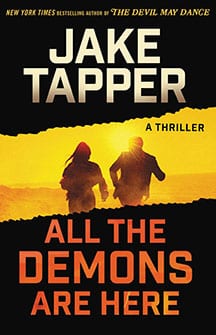
Every day, Jake Tapper goes live on CNN at 4 p.m. Eastern time and reports on the latest breaking news, from the culture war to battles between Republicans and Democrats, the war in Ukraine and economic instability in America. And when he goes home at night, he sneaks in some time to write about the drama of the past, from post-World War II America to the era of JFK and RFK and the post-hippie movement cults.
Tapper is CNN’s chief Washington correspondent, and a successful novelist. The first two books in his Charlie and Margaret Marder Mystery series were bestsellers, and the third, “All the Demons Are Here,” was published July 11.
 The books follow Charlie Marder, a politician, his wife Margaret and their children Ike and Lucy as they navigate life in America in the 1950s, ‘60s and ‘70s. They feature historical figures, including Frank Sinatra and the Rat Pack, U.S. Senator Joseph McCarthy, and Roy Cohn. In the latest installment, Charlie Marder has become a U.S. Senator, his daughter Lucy is a star reporter who is breaking stories about a serial killer and Ike is a Marine who has gone AWOL and is falling under the spell of the moody stunt master Evel Knievel.
The books follow Charlie Marder, a politician, his wife Margaret and their children Ike and Lucy as they navigate life in America in the 1950s, ‘60s and ‘70s. They feature historical figures, including Frank Sinatra and the Rat Pack, U.S. Senator Joseph McCarthy, and Roy Cohn. In the latest installment, Charlie Marder has become a U.S. Senator, his daughter Lucy is a star reporter who is breaking stories about a serial killer and Ike is a Marine who has gone AWOL and is falling under the spell of the moody stunt master Evel Knievel.
“I love history,” Tapper said. “One of the things that people see in my books is that the problems and forces in American life we have today we’ve seen before, whether it’s political demagogues or sleazy news operations or anger and paranoia. These things have been with us a long time, and we’ve dealt with them before in different ways. There is something reassuring in that.”
Writing fiction, instead of covering what’s going on in the world, is comforting to Tapper. “It’s a fun escape from the world of non-fiction, whether I’m talking about COVID or very nasty heated political battles or gun control, which is very upsetting to cover,” he said. “It’s nice to be able to control the characters and what is being said as opposed to nonfiction, where you don’t have a tremendous amount of control over the content.”
Though Tapper is widely known for his journalistic work, he started out as a novelist, writing his first book in college. However, his career quickly took him in a non-fiction direction.
“It was easier to break into journalism than fiction writing,” he said. “But I was always interested in it.”
Tapper was motivated to write the first book in the Marder series, “The Hellfire Club,” in 2018, after seeing that other journalists like Scott Simon at NPR and Jim Lehrer at PBS had also written novels. “The Hellfire Club” became a New York Times bestseller.
“The 1950s and early ‘60s seem very romantic and classic Americana on the surface, but in reality, they were also menacing periods full of dark, sinister forces,” he said. “There were conspiracies, racism, sexism and antisemitism that were much more prevalent then than today.”
Tapper, 54, grew up in Philadelphia during the 1970s and has vague memories of the lines at the gas station during the oil crises and his mom watching the Watergate hearings. His family was proudly Jewish: his dad was born Jewish and his mom was a convert, and they would go to synagogue for Shabbat and the holidays. He attended Camp Ramah in the Poconos, eventually working his way up to becoming a junior counselor, and he went to Akiba Hebrew Academy (now Jack M. Barrack Hebrew Academy), just outside of Philadelphia. In college, he studied at Tel Aviv University for a semester in 1988, and today, he goes to a synagogue in Washington, D.C., where he lives with his wife, son and daughter.
“There were certain values instilled I me as a Jew, which are a respect for debates and minority rights, as well as the importance of tikkun olam.“ – Jake Tapper
“There were certain values instilled I me as a Jew, which are a respect for debates and minority rights, as well as the importance of tikkun olam,” he said.
Tapper was always a news junky. Though he went to film school for one semester, he decided to shift to freelance writing and earned his first bylines in Washington City Paper.
“I had a natural curiosity about things,” he said. “I asked a lot of questions to find out answers and I wanted to cover stories that interested me.”
Tapper is interested in covering “stories where we can make a difference, affect change and find an injustice and fix it, or at least shine a light on it.”
Since Tapper first entered the news business decades ago, a number of publications have merged or shuttered, and there’s been a huge increase in citizen journalists.
“It’s become democratized with so many voices and outlets,” said Tapper. “In a great way, it’s empowered, but in other ways, it’s been problematic because of the trend of people pursuing news from ideological outlooks that only reaffirm their biases. Some outlets have pursued ideological journalism as a business plan at the expense of the truth. You see this with Fox News and the Dominion settlement. That’s a problem.”
As for now, the news anchor is going to continue reporting on the topics of the day and, in his spare time, he’s working on the fourth installment of the Marder series, set in the 1980s and following the 40th anniversary of the D-Day operation.
“Readers can view these events through the lens of a historical novel, where things didn’t happen but maybe they could have happened,” he said. “It could be fun. Mainly, I write these books because I want people to have fun.”
























 More news and opinions than at a Shabbat dinner, right in your inbox.
More news and opinions than at a Shabbat dinner, right in your inbox.